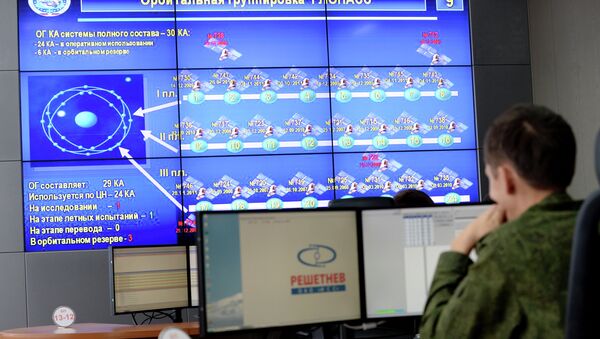MOSCOW, May 16 (RIA Novosti) – The unsuccessful launch of the Express AM4R communications satellite and the related suspension of Proton-M launches will not affect the Russian Glonass global navigation system, Glonass analyst Andrei Ionin said Friday.
The upper stage of a Russian Proton-M rocket suffered an unknown failure after launching from the Baikonur space center in Kazakhstan early on Friday, failing to send what would have been the nation's most powerful and advanced satellite into orbit.
The analyst believes that the incident will not affect the Glonass navigation satellite system. "I am confident that the Proton launches will soon resume. Secondly, we have a plan B for Glonass – the Soyuz rocket and the Plesetsk Cosmodrome, it has been repeatedly tested. And thirdly, we don’t really need to launch any more satellites for Glonass, it is deployed, we even have back-ups. Therefore this crash does not present any real threat to the Glonass program,” he said.
The Glonass network, which began operation in 1993, provides real-time positioning and speed data for surface, sea and airborne objects. Its accuracy is expected to be boosted to one meter (3 feet) when used within Russia by the end of the year. The Glonass network currently has 24 operational satellites, which is enough to provide global coverage, with the first overseas ground station launched in Brazil in February 2013.
Russia's full-scale plan for Glonass is to build 50 stations in several dozen countries across the globe. Last week, the Russian government approved bills to ratify space cooperation agreements with Nicaragua and Vietnam, which, among other measures provide for the construction of ground-based Glonass stations.
The Proton is the largest rocket in Russia’s fleet of space launch vehicles, and is the workhouse heavy lifter of the Russian space program. Since its first launch in 2001, the rocket has played a crucial role in the development of the Glonass navigation satellite system, and in Express satellite launches, which provide satellite communications across Russia.
In July, a Proton rocket crashed shortly after liftoff showering the surrounding countryside with 600 tons of flaming propellants.




